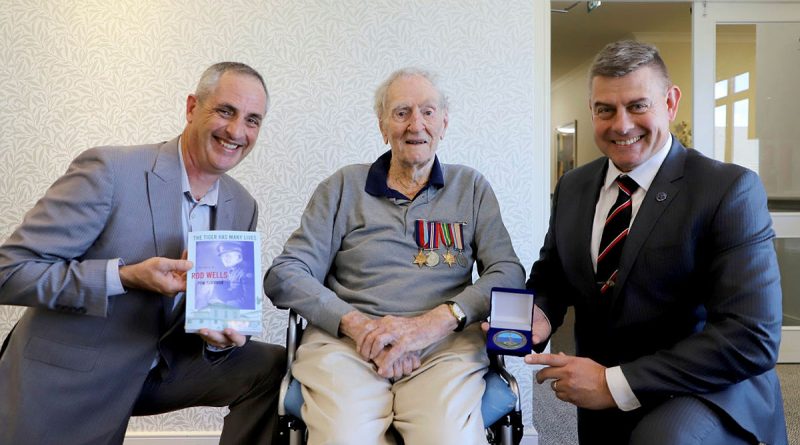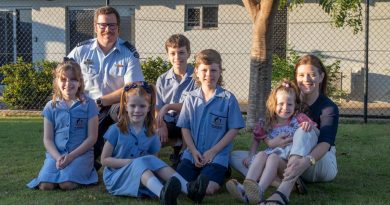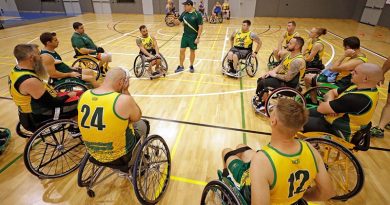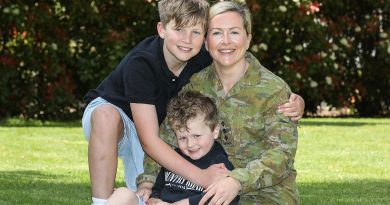Signalman a living legacy at age 106

At 106 years of age, veteran Signalman James ‘Jim’ Easton is thought to be Australia’s oldest living signaller.
CAPTION: Warrant Officer Class One Benn Goulter, left, and Brigadier Greg Novak, right, with veteran Signalman James ‘Jim’ Easton at the St Heliers Grace Joel Retirement Village, New Zealand. Story by Captain Evita Ryan. Photo by Maryvonne Gray.
He joined the Australian Army in March 1941 and discharged from 8 Division Signals five years later after experiencing more than three years of malnutrition and mistreatment as a prisoner of war in Singapore, Thailand and Burma during World War 2.
Defying all odds, Mr Easton has gone on to live a long and healthy life, celebrating his 106th birthday at the St Heliers Grace Joel Retirement Village, New Zealand, in December last year.
When word of Mr Easton’s service and milestone birthday found its way across the Tasman, it caught the attention of the Head of Corps of the Royal Australian Corps of Signals Brigadier Greg Novak.
“In January a social media group called ‘WWII uncovered’ put up a post about Jim, identifying him as a 106-year-old Australian Army World War 2 veteran from the Royal Australian Corps of Signals,” Brigadier Novak said.
“That post was seen by a member of one of our veterans’ associations and was shared online a few times before it was brought to my attention later that month.”
When Brigadier Novak and Regimental Sergeant Major for the Royal Australian Corps of Signals, Warrant Officer Class One (WO1) Benn Goulter, were invited to represent the corps at the Royal New Zealand Corps of Signals (RNZSigs) centenary commemoration, plans were put in place to visit Mr Easton at his retirement village in Auckland.
Shortly after landing in Auckland, the commemoration was cancelled because of Cyclone Gabrielle, and the visit to Mr Easton became the highlight of Brigadier Novak and WO1 Goulter’s shortened trip.
With their checked luggage lost to Auckland Airport in the aftermath of the cyclone, Mr Easton was quick to comment jovially that Brigadier Novak and WO1 Goulter weren’t wearing their uniforms when they arrived.
“We wished him a belated happy 106th birthday, and he straight away invited us to his next birthday,” Brigadier Novak said.
“I sincerely hope we’ll be able to make it across again, and bring one or two younger members of the corps to meet and talk with Jim.”
Sharing his secrets to a long life with his guests, Mr Easton admitted to never smoking a cigarette or drinking a glass of beer.
“I could never understand why anyone smoked,” Mr Easton said.
“I’ve seen a guy swap his soup with three beans in it for a cigarette.”
Mr Easton also told his guests the story of the autographed Japanese fundoshi, or loin cloth, that was donated to the Australian War Memorial.
In 1943, while a prisoner of war at Takanum, a Burma-Thailand railway construction camp in upper Thailand, Mr Easton ‘found’ the fundoshi near a Japanese troops’ clothesline.
At the end of the war, all the surviving signalmen from 8 Division Signals signed the fundoshi while they were awaiting repatriation to Australia.
Up until the age of 96, Mr Easton travelled back to Sydney for Anzac Day every year to catch up with his mates.
This year, at the Anzac Day service at his retirement village, Mr Easton read The Ode and sang a verse of one of his old Army songs before his thoughts inevitably turned back to his Army mates.
“Bits and pieces come back,” Mr Easton said, referring to his memories of what happened to him as a prisoner of war.
“So many of my friends died there. Some of them didn’t last a year after they got back and here I am, 70 years later and still going strong.”
.
.

.
.





